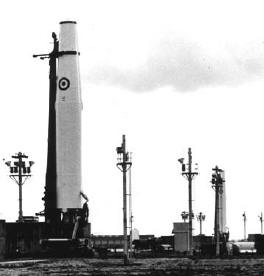|
|
 |
Thor was the free world's first operational intermediate range ballistic missile (IRBM).
It was 65 feet long, 8 feet in diameter and weighed 105,000
pounds. Douglas Aircraft was the prime aircraft contractor.
The missile utilized a single stage North American Rocketdyne LR-79
liquid oxygen rocket motor, which provided 150,000 lbs of static
thrust. This gave the Thor of range of 2,000 miles. It had an
inertial guidance system.
Development was rapid. The Thor entered active military service in September
1958. It was delivered to Cape Canaveral, Florida, for testing less than a year after the
development contract was signed. It was launched from a combination
transporter-erector vehicle and was directed to its target by a self-contained
inertial guidance system. It was originally
designated the SM-75, but later redesignated the PGM-17A. |
The Thor's
2,000 mile range was too limited for launching from the United States,
so it essentially turned the deployment over to the United Kingdom.
In early 1958, the two countries entered into an agreement whereby the
US would furnish the missiles and train the RAF launch crews and the
United Kingdom would build four Thor missile bases and man them with
RAF missile squadrons.
Thor missiles were assigned to the Strategic Air Command.
SAC activated the new 705th Strategic Missile Wing at Lakenheath RAF
Station on February 20, 1958, and assigned it to the 7th Air
Division It was soon moved to South Ruislip where it merged with
Headquarters 7th Air Division. The 705th was essentially a
"paper organization." It had no missiles and was manned
by 7th Air Division additional personnel. Thor training for
RAF crews was provided by the 392nd Missile Training Squadron,
which was activated at Vandenberg on 15 Sept. 1957
Training proceeded
rapidly. On April 16, 1959, an RAF crew launched it's first Thor
as part of the training program. By end of the year, three squadrons of
Thor IRBMs had been turned over to Royal Air Force and were operational
in the United Kingdom. On April 22, 1960, the fourth and final
Thor squadron was manned and activated. The Royal Air Force maintained
them in a combat-ready state.
The development of more advanced missiles
resulted in the Thor being retired from military service in 1963. However, some
of the missiles were modified and used extensively for space research, either as a
single-stage booster or in combination with various types of upper stages for
such projects as the Tiros, Telstar, Pioneer, and Discoverer
programs. The RAF Squadrons are listed below. |
| Unit |
Station |
Qty |
SAC
Turnover |
Indactivated |
| 77th RAF SMS |
RAF Feltwell |
15 |
June 22, 1959 |
July 1, 1963 |
| 7th RAF SMS |
RAF Hemswell |
15 |
Sept. 11, 1959 |
May 15, 1963 |
| 8th RAF SMS |
RAF Driffield |
15 |
Dec. 22, 1959 |
April 1963 |
| 44th RAF SMS |
RAF N. Luffenham |
15 |
April 29, 1960 |
Sept. 1963 |
|
|
SPECIFICATIONS
Length: 64 ft. 10 in.
Diameter: 8
ft. 0 in.
Weight: 109,330 lbs. at launch
Armament: Nuclear
warhead
Engine: Rocketdyne liquid-propellant
Thrust:: 150,000 lbs. thrust
Cost: $660,000 |
PERFORMANCE
Max. speed: 10,250 mph. / 8,907 knots
Max. range: 1,725 st miles / 1,499 naut miles
Max.
altitude: 390 st miles / 339 naut miles |
|
